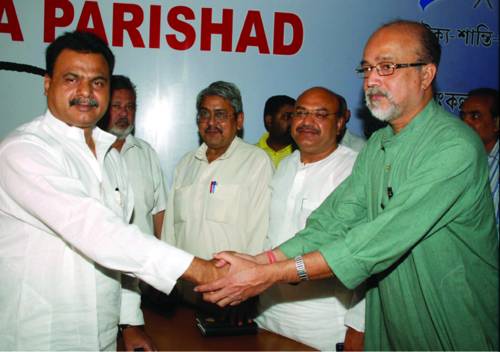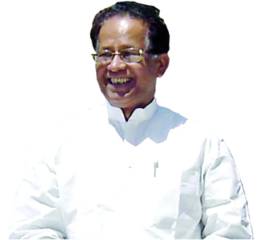Archives
TROUBLESOME TIE – UP FOR CONGRESS
Assam goes to polls on April 16 & 23, as the country embraces five-phased Lok Sabha election (between April 16 and May 13). There were some initial resentments among the political parties and general people for the first date, as it coincides with the Bohag or Rongali Bihu, but this resentment slowly diminished. The revised electoral rolls by the Election Commission of India identify 17,468, 958 voters eligible (in Assam) to exercise their franchises to form the 15th Lok Sabha (the lower house of Indian Parliament).
It may be mentioned that the main opposition party of Assam, the AGP had finalised a pre-poll alliance with the BJP leadership for the Lok Sabha polls in the first week of March. The deal was finalised in New Delhi in the presence of the BJP president Rajnath Singh, their prime ministerial candidate L. K Advani, the AGP president Chandra Mohan Patowary and its working Patowary and its working president Phani Bhushan Choudhury.

Commenting on the alliance, Advani said it would not only affect the electoral scenario of Assam, but of the entire Northeast which has a total of 24 Lok Sabha constituencies. He also termed the AGP as a party being ‘born out of a nationalist movement’ and has the experience of being in power twice in the State.
The regional party, which came into being after the end of the historic Assam agitation by All Assam Students Union, came to power two times (1985 to 1989 and 1996 to 2001) at Dispur. However they could not fulfill the expectations of the mainstream Assamese and later underwent a splitting and defeat against the Congress. The first split occurred in March 1991, when Bhrigu Kumar Phukan, Pulakesh Barua, Dinesh Goswami along with many others formed the Natun Asom Gana Parishad. Later they returned to the party in 1992. Then Atul Bora formed Trinamool Gana Parishad in 2000 and finally Prafulla Kumar Mahanta constituted his party, Asom Gana Parishad (Progressive) in 2005. Finally all the breakaway groups came together in October 2008.
The responsibility to lead the new look AGP was entrusted on Patowary.
The AGP had included the sitting MPs Sarbananda Sonowal (Dibrugarh Parliamentary constituency) and Arun Kumar Sarma (Lakhimpur) in their list of candidates with the tea tribe leader Joseph Toppo (Tezpur), Bhupen Rai (Barpeta), Sabda Rabha (Kokrajhar) and the former State minister Gunin Hazarika (Koliabor).
The reality is that the Congress leaders feel nervous of the tie-up. Because they might realise that the alliance will definitely help both the parties in the coming Assembly polls, if not immediately yielding any result in the parliamentary election. |
The BJP also announced the nomination of Ramen Deka (Mangaldoi), Bijoya Chakraborty (Guwahati), Rajen Gohain (Nagaon), Kamakhya P. Tasa (Jorhat), Sudangsu Das (Karimganj), Kabindra Purkayastha (Silchar) and Kulendu Daulagupu (Diphu).
The party, which decides to go to polls this time with the slogan ‘Mazbut Neta Aur Nirnayak Sarkar (strong leader and decisive government), has also decided to contest for two seats in Tripura, two in Arunachal Pradesh and one in Manipur.
The party campaign in the Northeast will focus on the ing being that in the Lok Sabha infiltration from neighbouring Bangladesh, the increasing terror menace and its impact on the society, and the development of the alienated region, informed the Assam BJP chief Ramen Deka.
The enthusiastic AGP president Patowary, while clarifying that his party was still a partner of National Democratic Alliance (led by the BJP), declared that the electoral understanding between AGP and BJP would definitely prevent Congress from taking advantage(as they took in earlier polls) and snatching power. “I admit that our alliance in 2001 Assembly polls was not fruitful but the situation then was different. We were divided and many grass-root level workers (of AGP) did not prefer the tie up. But now the understanding has been accepted by all our workers positively,” Patowary, also the Leader of Opposition in Assam Assembly, stated.
During the war of words between the AGP and the ruling Congress, the State health minister Sarma even claimed that there were some financial understandings between the two parties (where AGP turned out to be a beneficiary) to make the alliance work. The argument, Sarma put in support of his claim is that because of such an inherent deal, the
AGP had to leave the prestigious Guwahati seat to the BJP ignoring the resentments of the lower level party workers.
His allegation was hit back by the AGP general secretary Atul Bora (junior) promptly. Bora asked for credible proof from Sarma in support of his allegation that money was involved in the deal. He even threatened to take the Congress minister to court for his baseless comments. Bora reiterated that the Congress leaders including Gogoi got so frustrated at the development (electoral adjustment of AGP with BJP) that they have started making irresponsible comments.
It is also mentionable that the Chief Minister himself admitted that the electoral tie-up of the AGP and the BJP would be a factor in the polls, but did not hesitate to criticise both the alliance partners as ‘betrayers’.
Gogoi asserted that as the two betrayers had come together, it becomes easy for the Congress to gain in the elections. He particularly criticised the AGP leaders for ‘surrendering’ to the BJP in the name of an electoral alliance. “I am surprised why the Congress leaders including Gogoi became so vocal on the issue. It is absolutely our preference and decision.
Gogoi and his ministerial colleagues should rather concentrate on their strategies for the polls,” Patowary commented during a press meet at the AGP head office in Guwahati recently.
The brave student leader of yesteryears, Patowary also criticised the Congress party for maintaining double standards saying, “They claim to be a secular party but continue an alliance with the Indian Union Muslim League in Kerala.”
The century old Congress party has lost the mass support today and now they are in a position to form the government in New Delhi without the support of regional parties in various parts of the country. In Assam too they have been supported by Bodoland Peoples’ Party (led by Hagrama Mohilary), Patowary stated. The State BJP chief Deka also expressed optimism that the AGP-BJP alliance would drastically reduce the division of anti-Congress votes (read indigenous Assamese) in the State and this will finally result in favour of both the parties. As the two important opposition parties fought separately in the 2004 polls, the anti-Congress votes were simply divided. Now there should emerge a real different equation, Deka added.
Soon after the regional political party of the state had entered into an electoral alliance with the Bharatiya Janata Party (BJP), the Congress leaders including the State Chief Minister Tarun Gogoi started making comments against the leaders of the party. |
In the last Lok Sabha polls, both the parties fielded their own candidates, where both won two seats each. The AGP candidates won in Lakhimpur and Dibrugarh, whereas the BJP candidates achieved success in Nowgong and Mangaldoi. The ruling Congress won nine seats and polled 35.07% votes in their favour. For AGP it was 19.95% and for the BJP candidates the percentage was 22.94.
The Statesman, a mainstream Indian national newspaper editorialized the issue of AGP-BJP alliance saying, “The welcome change of understand being that in the Lok Sabha elections the BJP will be the senior partner with more seats and, in the 2011 assembly elections, the AGP will have the greater say.” It also added that ‘in the 2004 elections, the BJP fielded well-known Assamese singer Bhupen Hazarika for the Guwahati seat and the AGP’s gamble to field Bhrigu Phukan (since deceased) against him did not pay off’, but if the percentage of votes that the AGP and BJP polled in the last parliamentary elections is any indication, their electoral prospects this time around seem better.’ “Besides, both parties did improve their position in the 2006 assembly elections while the Congress tally fell from 73 to 53. Ideologically there is nothing in common between the AGP and BJP, their main objective being to avert a three-way split in the vote since they both share the same source base and to humiliate the ruling party ——. Now that the AGP is one entity as the breakaway groups have returned to the fold, it should do well,” the editorial concluded.
The Chief Minister came out with statements that the AGP had damaged the future of regional politics (by entering into a relationship with the BJP) in this part of the country. |
However Gogoi claimed that it ‘would be too simplistic to think that the AGP-BJP vote share in 2004 polls put together is an indication of winning’. The veteran Congress leader rather insisted that the AGP had lost its image of a credible regional political party after tying up with the BJP.
“Gogoi and his colleagues may not admit that the AGP-BJP alliance will go stronger for the 2011 State Assembly election. The reality is that the Congress leaders feel nervous of the tie-up. Because they might realise that the alliance will definitely help both the parties in the coming Assembly polls, if not immediately yielding any result in the parliamentary election,” commented a Guwahati based political observer Rupam Baruah.
Another major challenge for the Congress might emerge from Asom United Democratic Front (led by the perfume merchant turned political leader Badaruddin Ajmal). The pro-Muslim party has the potential to damage the traditional minority vote share (nearly 30% Muslim votes) of the Congress in the State. Discussions went on in full swing for an electoral tie-up between the Congress and the AUDF, but Gogoi remained adamant
against it. Gogoi might have thought that the association of Badaruddin led AUDF with the Congress would decline the support base of the mainstream Hindu Assamese for the ruling party. It is mentionable that during the 2006 Assembly polls, the Congress received support from them in addition to their traditional Muslim and tea plantation labour votes.
By any means, the Congress is anticipated to face major challenges in nurturing the indigenous Asomiya votes in its favour, as well as the minorities during the forthcoming elections.

